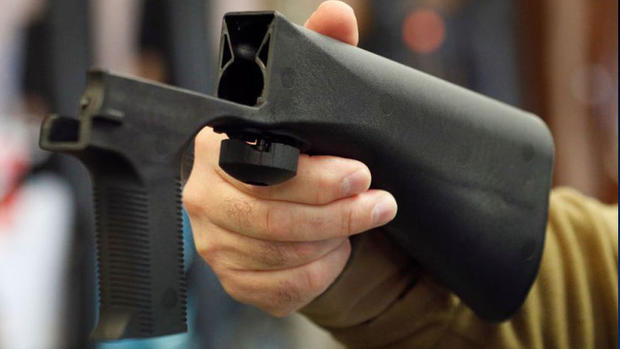
The Supreme Court has granted a hearing for a case regarding the prohibition of bump stocks for guns.
The Supreme Court announced on Friday that it will review a challenge against a regulation implemented during the Trump administration which prohibits the use of “bump stocks.” These devices are used to increase the firing rate of semi-automatic rifles.
The court has agreed to hear the case of Garland v. Cargill in a short, unsigned order. There were no recorded disagreements among the justices. They have also accepted a case regarding the National Rifle Association and another dispute concerning arbitration agreements.
The focal point of the legal dispute surrounding bump stocks is a regulation put forth by the Bureau of Alcohol, Tobacco, Firearms and Explosives (ATF) in 2018. This rule broadened the scope of what is considered a “machine gun” under the National Firearms Act to include bump stocks. Possession of this device could result in felony charges for an individual.
The tragic event that took place in Las Vegas in 2017 resulted in the loss of 58 lives and left over 500 individuals wounded. The perpetrator was able to use certain devices to shoot “several hundred rounds of ammunition” at the concert-goers. This incident remains the deadliest mass shooting in the history of the United States.
is still ongoing
The legal battle regarding the ban on bump stocks is still ongoing.
A device known as a bump stock is displayed at a gun store in Salt Lake City, Utah on October 5, 2017. This device can be attached to a semi-automatic rifle to enhance its firing rate, making it comparable to a fully automatic rifle.
In April 2018, Michael Cargill purchased two bump stocks prior to the ATF’s ban on them. However, he surrendered the items in March 2019 when the ban took effect. On the same day, he initiated a lawsuit in a federal court in Texas, contesting the ban on multiple legal grounds.
The federal government was supported by the district court’s ruling, which stated that bump stocks enable multiple shots to be fired with a single trigger pull. The court also recognized that a bump stock effectively turns a weapon into an automatic one, as it is a self-acting mechanism that allows for continuous firing.
The appeals court panel, consisting of three judges, concurred with the district court’s ruling that bump stocks fall under the definition of machine guns in federal law. However, the entire U.S. Court of Appeals for the 5th Circuit overturned the panel’s decision based on a legal principle that dictates the court must support the challenger in cases of unclear laws. Upon finding ambiguity in two aspects of the National Firearms Act, the 5th Circuit determined that a bump stock without mechanical components does not meet the criteria to be classified as a machine gun according to the law.
The Biden administration requested that the Supreme Court address the issue of the bump stock ban in April. They argued that the ATF’s rule did not alter the restriction on machine guns, but rather was a way of communicating the agency’s stance that bump stocks should be considered machine guns.
According to the Justice Department, bump stocks enable a shooter to shoot numerous bullets in a short amount of time with just one trigger pull. These modified rifles, similar to machine guns, pose a serious risk and have been banned by Congress for a valid reason. The Justice Department argued to the Supreme Court that the lower court’s ruling goes against the most accurate interpretation of the law, causes a conflict among circuits, and poses a significant threat to public safety.
The Biden administration informed the court that the 5th Circuit’s ruling is at odds with decisions from at least three other appeals courts, all of which dismissed attempts to challenge the ban on bump stocks. The Supreme Court has also ruled on this matter.turned away disputes over the rule and has declined to stop its enforcement.
The Solicitor General, Elizabeth Prelogar, cautioned that if the lower court’s decision is upheld, it could have far-reaching effects across the country. It would permit manufacturers in the Fifth Circuit to sell bump stocks to individuals without requiring background checks or registration of the devices.
She stated that with firearms being present throughout the country, there is not much evidence to suggest that these devices will only be used in the Fifth Circuit.
Attorneys representing Cargill are also requesting that the Supreme Court address the legal challenge to ATF’s prohibition on bump stocks, contending that the federal definition of a machine gun is a matter of great importance to a large number of individuals in the United States.
According to a recent filing by Cargill’s lawyers, Americans purchased 520,000 bump stocks over a period of nine years while they were still permitted. However, the recently implemented ban now mandates that these devices be turned in or destroyed.
The attorneys stated that, despite previous reassurances from ATF that it was legal to possess a bump stock according to federal law, the Final Rule now considers anyone who has ever possessed one as a criminal.
Source: cbsnews.com